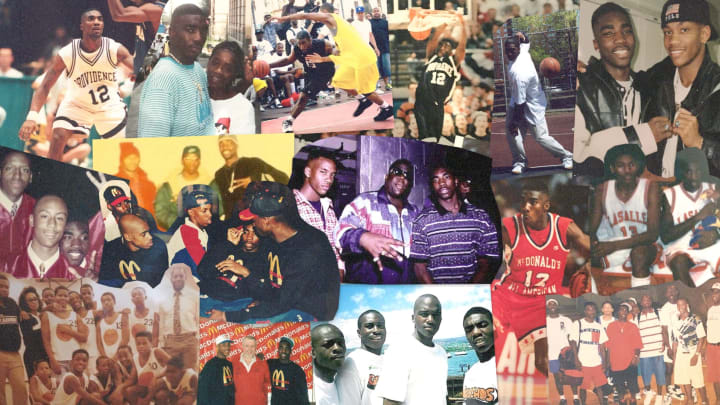
The Power of Words
日本語版はこちら
(Note: This article is a translation of the original, which is in Japanese.)
“Yuta, you had a good rebound during garbage time in today’s game.”
A reporter once said those words to me during a postgame press conference.
I snapped back immediately and said, “There is no such thing as garbage time, in my opinion.”
The room froze. I’m sure the reporter didn’t mean it in a negative way. We’d been winning by a comfortable margin and there was only a minute or two left in the game. I could tell he wanted to write a positive article about me, but I just couldn’t settle for the words he chose to use.
“Garbage time.”
When you translate it into Japanese, it basically means “waste of time.”
It’s that time at the end of a game where the gap in the score is so big that the outcome of the game is obvious. It’s a term often used in the NBA, but I’ve never gotten used to it.
There are only 450 players who have the opportunity to play in the best basketball league in the world. I’ve heard it said that the total number of basketball players in the world is something like 450 million, so it’s quite literally a one-in-a-million chance to play basketball in the NBA. After years of hard work and making countless sacrifices, I finally made it. So as long as I’m on an NBA court, there is no garbage time — it doesn’t matter if it’s a minute or even a second. There is no guarantee that I’ll be able to play in the next game, so every moment is a chance to make my mark. That’s the reason why there is no “garbage time” in my dictionary.
The power of words. That is what I believe in. Positive or negative, words shape the mind, and the mind dictates the future. I’d like to spend some time talking about the words and phrases that I cherish. Words that have shaped me as a person, and as a player.
“Shoshin and kenkyo. These are two words that you must never forget.”
That is what Shikama-sensei, my high school coach and mentor taught me.
They mean, respectively, “beginner’s mind” and “humility.”
Even though I play in the NBA now, I haven’t always played at an elite level. I experienced a heap of growing pains in junior high school, and I struggled to get accepted into a high school with a strong basketball team. I was rejected from one school after another. It was under such difficult circumstances that Shikama-sensei from Jinsei Gakuen gave me the chance. At the time, Jinsei Gakuen wasn’t a high school that was recognized nationally for its basketball program, but Shikama-sensei was renowned as a good coach. Under his tutelage, day in and day out, I trained very hard. And then, in my sophomore year, I made the Japanese national team as the youngest player ever.
I’ll never forget the words that came out of Shikama-sensei’s mouth: “Keep humble. Don’t become cocky because you made the national team.”
He explained to me that being a member of the national team meant the number of people supporting me would increase. But at the same time, the number of haters would also increase. (Yes, we also have haters in Japan.)
“More than the older athletes, you have to make sure you pay attention to etiquettes and manners as a high school kid, especially off the basketball court,” Shikama-sensei added.
Since then, I have lived by the word kenkyo (humility).
As a result, I’ve been helped by people around me on countless occasions.
After finishing high school in Japan, I arrived in America without being able to speak English. Before I left Japan, I had been faced with many comments from critics: The language barrier would be too high, I was too old to start playing in America, and other things like that. But all I paid attention to was Shikama-sensei’s phrase, shoshin (beginner’s mind). I also never forgot my childhood dream of playing in the NBA.
It’s been eight years, almost a third of my life, since I moved to America. I’m appreciative of all the people who have supported me during my journey — from my teammates at St. Thomas More School, who helped me out with my English, to the guys at George Washington University who assisted me with my studies. Throughout that time, I tried to remain as humble as possible. Even now in the NBA, I try to do so.
Between America and Japan, I feel the nuance of humility is somewhat different. To illustrate this, let me tell you a story that happened between myself and my parents.
I can still recall it as clear as day. It was during my senior year of college. The season had just ended and I was really starting to gauge my chances of getting a spot in the NBA. To be honest, I didn’t think I had much hope of being drafted, so I felt I had to perform well in the Summer League. I’m very close to my parents, who live in Kagawa, Japan. We keep in touch all the time. One day I received a message from them.
“Hey Yuta, we bumped into so-and-so the other day. He asked us if you were going to make it as an NBA player. Half-jokingly, we told him that you still had a very long way to go.”
When I read that message, I was really shocked.
Even though I felt I wasn’t likely to be drafted, I made sure I trained harder than anybody else. At the time, I didn’t feel confident. I felt lonely and I was doing my best to motivate myself and think positively. Unconsciously, I was probably desperate for some words of affirmation. It was under such difficult circumstances that I got that message from my parents.
From my parents’ perspective, they were just being modest about my chances. I understood where they were coming from. But when I heard my parents say, “Oh, Yuta has a very long way to go,” I could only hear negativity. I couldn’t bear it.
Ever since I started to live in America, I have been very aware that American parents always praised their children. It wasn’t unusual for my teammates’ parents to confidently say something like, “Oh, isn’t my son amazing?” To be honest, I would feel jealous when I heard parents praise their kids so highly in public.
I hesitated whether or not to confront my parents. I actually reached out to my high school teammate Ryusui Kusumoto. Ryusui currently coaches the basketball team at Nobeoka Gakuen. He’s one of my best friends and I respect his thoughts on tactics and his mental approach to the game.
I told him, “What my parents said really bothered me. I know Mom and Dad both support me to the fullest, so there’s probably no need to verbalize it ... but it’s eating me up inside.”
Ryusui’s answer was simple. “If you’re mulling over it, just tell them. They’ll understand where you’re coming from.”
With those words, I let my parents know my honest thoughts.
I texted them: “I’m in a critical moment in my basketball career and I don’t need any negative words that dampen my determination. Both of you guys understand me more than anyone else, and ever since I started to play basketball, you’ve been my biggest supporters. That’s why I need you to have my back until I make it to the NBA.”
My parents called me straight away. Familiar voices from my homeland … their first words were, “Sorry, son.”
I remember my chest tightening when I heard those words.
That’s the power of words. If I weren’t putting in 110% in training or if I had no talent, I’d be fine with hearing, “Our son has a very long way to go.” But my parents knew how hard I was working. I felt like I had a chance to play in the NBA, so I wanted to absorb positive thoughts rather than negative thoughts. I wanted to hear the positivity from my parents.
That reminds me of another story from my college days, actually. In my freshman year, I was able to perform well. In my sophomore year, though, I was suddenly in a slump.
This isn’t how it’s supposed to be … why is this…?
I struggled to find an answer. I was trapped in a tunnel without an exit.
Then, perfect timing: Shikama-sensei wrote me a message from Japan out of the blue.
“Play with a smile.”
That was all he wrote. Those words opened my eyes. I remembered why I loved basketball so much. Those were the words Shikama-sensei used to say to us in high school. The very next game, I had a career-high performance. That’s the power of a few simple words.
In 2018, I was finally able to take a tangible step toward joining the NBA — something that I had dreamed about for so long. In my first season with the Memphis Grizzlies, I was impressed by how things were done in the NBA, but I didn’t have much playing time on the court. My second season was more or less similar. I spent most of my time in the G League. Even when I got a call-up, it was only when there was an injured player and I was there to assist him with rehab during training. It was a tough time for me, honestly.
Now in my third year, I’ve moved to the Toronto Raptors. As soon as I joined the team and training camp started, I saw what sort of team the Raptors were, what the other players were doing, and thought about what I could do to contribute. Toronto is a team that uses defense to build on offense. I’m a good defensive player, so I can make my mark on the defensive end and make my presence felt by getting rebounds. I’m always trying to think analytically and figure out how my skills can be maximized for the team.
“Be a player who can lead the team to victory.”
This is another lesson Shikama-sensei used to repeat. It’s one of the most important lessons he instilled upon me. Since I’ve started to play in the NBA, it’s become even more significant.
In this world, there are star players with egos. I know I’m not that kind of player. The team doesn’t need me to hold on to the ball for a long time and shoot a lot. I feel I can contribute to the team by doing the dirty work that doesn’t necessarily translate to stats.
The other day I was having a chat with someone I knew. He told me, “You know, Yuta, maybe your kenkyo is a mixture of being humble and being grateful.”
That’s a pretty good way to put it.
Because of my journey, every second that I am on an NBA court is very meaningful to me.
A few weeks ago, I signed a contract with the Raptors. I’m really happy, but it doesn’t change what I need to do on the court. I want to elevate my game as a role player and always aim to improve.
There is no “garbage time” in my lexicon.
One minute, one second … there is no dead time.
When I’m on the court, I play to the max of my ability.
It’s that simple.

